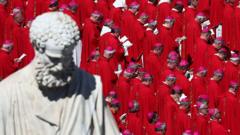Just over 130 cardinals are set to meet this week in the historically rich confines of the Sistine Chapel to select a successor to the late Pope Francis. This conclave represents arguably the most secretive election in existence, as each of the 133 cardinals will take an oath on the gospels to uphold complete confidentiality about the proceedings for life. Such solemnity extends to every individual present within the Vatican's walls during the conclave, including medical personnel and kitchen staff, all of whom pledge to maintain "absolute and perpetual secrecy."
Before the conclave begins, an extensive sweep of the chapel and nearby guesthouses will occur to eliminate any hidden microphones or recording devices. The Vatican employs electronic jammers to block any incoming or outgoing signals, safeguarding the sanctity of the election process. "The Vatican takes the idea of isolation extremely seriously," notes John Allen, editor of the Crux news site.
This total lockdown serves not only to protect the confidentiality of the vote but also to thwart any harmful intentions from infiltrating forces or outside disruptions. Cardinals may not bring any electronic devices, as they must surrender phones, tablets, and smartwatches upon entry. The Vatican's own police enforce strict adherence to these rules.
"There are no televisions, newspapers, or radio in the guesthouse for the conclave," shares Monsignor Paolo de Nicolo, a veteran of the Papal household. This stringent environment is further exacerbated by the fact that windows cannot be opened, isolating the cardinals from external influences. Communication with the outer world is highly restricted, with cardinal electors remaining in "incommunicado" status during this crucial selection.
While the conclave maintains strict silence, speculation surrounding potential candidates intensifies in the lead-up to the vote. The press and citizens alike partake in what some call "cardinal-hunting," observing and trying to decipher candidate allegiances through sightings and rumored gatherings. Various outlets have highlighted clandestine lunches involving cardinals, and reporters diligently quiz restaurant staff regarding overheard discussions.
With nearly 250 cardinals present, focusing on those eligible—under 80 years of age—adds to the complexity. Each day, these potential electors navigate media scrutiny, often responding with vague statements emphasizing unity and a brief conclave.
Ines San Martin from the Pontifical Mission Societies notes the necessity of generating a religious rather than a political discourse around the election: "We say the Holy Spirit guides the conversation and the vote." The role of the pope carries immense global weight, impacting everything from social justice to international diplomacy.
Even as a variety of factions and advocates seek to sway the election, the clandestine nature of the conclave attempts to drown out these "outside forces." Reports suggest that while lobbying does occur, challenges persist, given that many newly appointed cardinals are unfamiliar with one another, complicating efforts to influence voting dynamics.
As the conclave approaches, the cardinal electors will be firmly situated within the Vatican, devoid of devices, and insulated from the tumult of public opinion. The depth of their discussions could be pivotal, as emerging leaders may reveal transformative ideas and outlooks, reflective of a new direction for the Church in a rapidly evolving world.


















